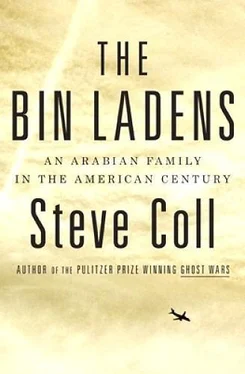There was one portfolio of secrets binding King Fahd and President Reagan that winter that unquestionably involved Salem Bin Laden, however. These concerned the covert aid provided by the United States and Saudi Arabia to anti-communist rebels fighting Soviet forces in Afghanistan. The United States and Saudi Arabia each had already channeled several hundred million dollars in cash and weapons to the Afghan rebels since the Soviet invasion in 1979. It seems probable that when Salem reached Washington that winter, he would have passed to King Fahd, if not directly to the White House, the video evidence he had just gathered documenting Osama’s humanitarian work on the Afghan frontier. As he welcomed Fahd to the White House, Reagan took pains to acknowledge Saudi Arabia’s particular efforts to support Afghan refugees on the Pakistani frontier: “Their many humanitarian contributions touch us deeply,” Reagan said. “Saudi aid to refugees uprooted from their homes in Afghanistan has not gone unnoticed here, Your Majesty.”
That February of 1985, in Pakistan, the leading Saudi provider of such assistance was Salem’s half-brother, Osama. Reagan’s language suggested that he had been given at least a general briefing about Osama’s work.
“We all worship the same God,” Reagan said. “The people of Afghanistan, with their blood, courage and faith, are an inspiration to the cause of freedom everywhere.” 17
YEARS LATER, as he grew into middle age, Osama Bin Laden gradually abandoned the sources of identity that were his birthright, and which had heavily influenced his early life—his membership in the wealthy Bin Laden family, and his privileges as a subject of the kingdom of Saudi Arabia. He eventually declared himself at war with Saudi Arabia’s royal family, and by doing so placed himself in violent opposition to his own family’s interests, a posture that was apparently so fraught for him that he very rarely spoke about it in public. When he did, he blamed the Saudi royals for trying “to create a problem between me and my family.” He has never denounced or openly repudiated his own family, and he has explained their occasional statements repudiating him as merely the product of heavy pressure brought to bear by the Saudi government. 18
After September 11, it became commonplace to trace the sources of Osama’s radicalism to the Islamic political revival that swept the Middle East after 1979, and also to his experiences as a jihad fighter and organizer during the anti-Soviet Afghan war. These were crucial influences on him, but to focus on them exclusively is to risk passing over the complexity of Osama’s relationship with his family and his country, the sources of attraction and repulsion these ties created in his life, and their influence on his character and ideas. These latter subjects are ones that the Bin Ladens and the Saudi royal family have tried to keep as private as possible.
The extraordinary story of the Bin Laden family’s rise during the twentieth century is compelling even where it does not touch upon Osama at all. For many of the Bin Ladens of Osama’s generation, family ties proved to be changeable and, above all, complicated. Theirs is a story of modernization and power in Saudi Arabia, a young and insecure nation where the family is by far the most important unit of politics. “The Arabia of the Sauds,” as the country’s name signifies, accurately conveys the ruling Al-Saud family’s conception of its power. In their country, political parties are banned, even social clubs are frowned upon, and tribes are relatively weak; family and religious faith offer by far the most legitimate sources of public identity. Within the business community to which they belonged, the Bin Ladens were by no means the kingdom’s most significant family, but across decades they built a unique and important partnership with the Al-Saud, anchored by the Bin Laden family’s role, from the 1950s onward, as the official building and renovation contractors of the Islamic holy cities of Mecca and Medina, and, for a time, Jerusalem.
The family generation to which Osama belonged—twenty-five brothers and twenty-nine sisters—inherited considerable wealth, but had to cope with intense social and cultural changes. Most of them were born into a poor society where there were no public schools or universities, where social roles were rigid and preordained, where religious texts and rituals dominated public and intellectual life, where slavery was not only legal but openly practiced by the king and his sons. Yet within two decades, by the time this generation of Bin Ladens became young adults, they found themselves bombarded by Western-influenced ideas about individual choice, by gleaming new shopping malls and international fashion brands, by Hollywood movies and alcohol and changing sexual mores—a dizzying world that was theirs for the taking, since they each received annual dividends that started in the hundreds of thousands of dollars. These Bin Ladens, like other privileged Saudis who came of age during the oil shock decade of the 1970s, became Arabian pioneers in the era of globalization. The Bin Ladens were the first private Saudis to own airplanes, and in business and family life alike, they devoured early on the technologies of global integration. It is hardly an accident that Osama’s first major tactical innovation as a terrorist involved his creative use of a satellite telephone. It does not seem irrelevant, either, that shocking airplane crashes involving Americans were a recurrent motif of the family’s experience long before September 11.
The Bin Laden family saga also provides a particularly consequential thread of the troubled, compulsive, greed-inflected, secret-burdened, and, ultimately—to both sides—unconvincing alliance between the United States and Saudi Arabia during the oil age. Until Osama announced himself as an international terrorist, his family was much more heavily invested in the United States than has generally been understood—his brothers and sisters owned American shopping centers, apartment complexes, condominiums, luxury estates, privatized prisons in Massachusetts, corporate stocks, an airport, and much else. They attended American universities, maintained friendships and business partnerships with Americans, and sought American passports for their children. They financed Hollywood movies, traded Thoroughbred horses with country singer Kenny Rogers, and negotiated real estate deals with Donald Trump. They regarded George H. W. Bush, Jimmy Carter, and Prince Charles as friends of their family. In both a literal and a cultural sense, the Bin Laden family owned an impressive share of the America upon which Osama declared war, and yet, as was true of the relationship between the Saudi and American governments, their involvement in the United States also proved to be narrow and brittle. This made both Osama’s anti-American ideology and his family’s response to it all the more complex.
The Bin Laden family’s global character owes much to the worldwide shape of the oil market and the wealth it created after 1973, but it is rooted, too, in an age before combustion engines. Osama’s generation of Bin Ladens was the first to be born on Saudi soil. Their father, Mohamed, the gifted architect of the family’s original fortune, migrated from a mud-rock fortress town in a narrow canyon in the remote Hadhramawt region of Yemen. He belonged to a self-confident people who were themselves pioneers of globalization, albeit in a slower-paced era of sailing ships and colonial power. Mohamed Bin Laden bequeathed to his children not just wealth, but a transforming vision of ambition and religious faith in a borderless world.
PART ONE
PATRIARCHS
1900 to September 1967
Читать дальше












